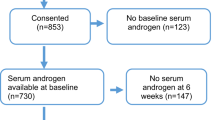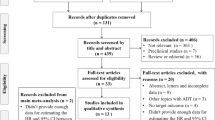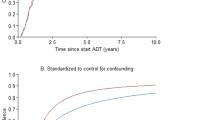Abstract
Background:
Although testosterone suppression during androgen-deprivation therapy (ADT) and obesity have been reported to affect ADT efficacy, there are few comprehensive analyses on the impact on ADT outcome. Recently, we demonstrated that the SRD5A2 polymorphism was associated with metastatic prostate cancer prognosis. Therefore, in this study, we investigated the relationship between ADT serum testosterone levels or body mass index (BMI) and the prognosis among men treated with primary ADT for metastatic prostate cancer. In addition, we examined the association of serum testosterone levels during ADT with the SRD5A2 polymorphism.
Methods:
This study included 96 Japanese patients with metastatic prostate cancer. The relationship between clinicopathological parameters, including serum testosterone levels during ADT and BMI, and progression-free survival, overall survival and survival from progression following primary ADT treatment for metastatic prostate cancer was examined. Additionally, the association between the SRD5A2 gene polymorphism (rs523349) and serum testosterone levels during ADT was examined in 86 cases.
Results:
Among clinicopathological parameters, the lowest quartile of serum testosterone levels during ADT was a significant predictor of better overall survival as well as survival from castration resistance. However, BMI was not associated with prognosis. The CC allele in the SRD5A2 gene (rs523349), encoding the less active 5α-reductase, was associated with lower serum testosterone levels during ADT.
Conclusions:
Taken together, these findings revealed a dramatic suppression of serum testosterone by ADT was associated with better survival among men with metastatic prostate cancer that have undergone primary ADT, which may be affected by the SRD5A2 gene polymorphism.
This is a preview of subscription content, access via your institution
Access options
Subscribe to this journal
Receive 4 print issues and online access
$259.00 per year
only $64.75 per issue
Buy this article
- Purchase on Springer Link
- Instant access to full article PDF
Prices may be subject to local taxes which are calculated during checkout


Similar content being viewed by others
References
Siegel RL, Miller KD, Jemal A . Cancer statistics, 2015. CA Cancer J Clin 2015; 62: 10–29.
Fujimoto H, Nakanishi H, Miki T, Kubota Y, Takahashi S, Suzuki K et al. Oncological outcomes of the prostate cancer patients registered in 2004: report from the Cancer Registration Committee of the JUA. Int J Urol 2011; 18: 876–881.
Morote J, Orsola A, Planas J, Trilla E, Raventós CX, Cecchini L et al. Redefining clinically significant castration levels in patients with prostate cancer receiving continuous androgen deprivation therapy. J Urol 2007; 178: 1290–1295.
Perachino M, Cavalli V, Bravi F . Testosterone levels in patients with metastatic prostate cancer treated with luteinizing hormone-releasing hormone therapy: prognostic significance? BJU Int 2010; 105: 648–651.
Bertaglia V, Tucci M, Fiori C, Aroasio E, Poggio M, Buttigliero C et al. Effects of serum testosterone levels after 6 months of androgen deprivation therapy on the outcome of patients with prostate cancer. Clin Genitourin Cancer 2013; 11: 325–330.
Kamada S, Sakamoto S, Ando K, Muroi A, Fuse M, Kawamura K et al. Nadir testosterone after long-term follow-up predicts prognosis of prostate cancer patients treated with combined androgen blockade. J Urol 2015; 194: 1264–1270.
Yasuda Y, Fujii Y, Yuasa T, Yamamoto S, Yonese J, Fukui I . Do testosterone levels have prognostic significance in patients with metastatic prostate cancer treated with combined androgen blockade? Int J Urol 2015; 22: 132–133.
Shiota M, Yokomizo A, Takeuchi A, Imada K, Kiyoshima K, Inokuchi J et al. The feature of metabolic syndrome is a risk factor for biochemical recurrence after radical prostatectomy. J Surg Oncol 2014; 110: 476–481.
Allott EH, Masko EM, Freedland SJ . Obesity and prostate cancer: weighing the evidence. Eur Urol 2013; 63: 800–809.
Rodriguez C, Patel AV, Calle EE, Jacobs EJ, Chao A, Thun MJ . Body mass index, height, and prostate cancer mortality in two large cohorts of adult men in the United States. Cancer Epidemiol Biomarkers Prev 2001; 10: 345–353.
Calle EE, Rodriguez C, Walker-Thurmond K, Thun MJ . Overweight, obesity, and mortality from cancer in a prospectively studied cohort of U.S. adults. N Engl J Med 2003; 348: 1625–1638.
Keto CJ, Aronson WJ, Terris MK, Presti JC, Kane CJ, Amling CL et al. Obesity is associated with castration-resistant disease and metastasis in men treated with androgen deprivation therapy after radical prostatectomy: results from the SEARCH database. BJU Int 2012; 110: 492–498.
Oefelein MG, Cornum R . Failure to achieve castrate levels of testosterone during luteinizing hormone releasing hormone agonist therapy: the case for monitoring serum testosterone and a treatment decision algorithm. J Urol 2000; 164: 726–729.
Smith MR . Obesity and sex steroids during gonadotropin-releasing hormone agonist treatment for prostate cancer. Clin Cancer Res 2007; 13: 241–245.
van der Sluis TM, van Moorselaar RJ, Meuleman EJ, ter Haar RW, Bui HN, Heijboer AC et al. Relationship between body mass index and serum testosterone concentration in patients receiving luteinizing hormone-releasing hormone agonist therapy for prostate cancer. Urology 2013; 81: 1005–1009.
Saylor PJ, Smith MR . Metabolic complications of androgen deprivation therapy for prostate cancer. J Urol 2013; 189: S34–S42.
Shiota M, Fujimoto N, Yokomizo A, Takeuchi A, Itsumi M, Inokuchi J et al. SRD5A gene polymorphism predicts prognosis of metastatic prostate cancer with androgen-deprivation therapy. Eur J Cancer 2015; 51: 1962–1969.
International Union Against Cancer: Urologic Tumors. Prostate. In: Sobin LH, Wittekind CH (eds). TNM Classification of Malignant Tumors, 5th edn. John Wiley & Sons: New York, 1997, pp 170–173.
Scher HI, Halabi S, Tannock I, Morris M, Sternberg CN, Carducci MA et al. Design and end points of clinical trials for patients with progressive prostate cancer and castrate levels of testosterone: recommendations of the Prostate Cancer Clinical Trials Working Group. J Clin Oncol 2008; 26: 1148–1159.
McGrowder DA, Jackson LA, Crawford TV . Prostate cancer and metabolic syndrome: is there a link? Asian Pac J Cancer Prev 2012; 13: 1–13.
Barrington WE, Schenk JM, Etzioni R, Arnold KB, Neuhouser ML, Thompson IM Jr et al. Difference in association of obesity with prostate cancer risk between US African American and Non-Hispanic white men in the selenium and vitamin E cancer prevention trial (SELECT). JAMA Oncol 2015; 1: 342–349.
Klotz L, O'Callaghan C, Ding K, Toren P, Dearnaley D, Higano CS et al. Nadir testosterone within first year of androgen-deprivation therapy (ADT) predicts for time to castration-resistant progression: a secondary analysis of the PR-7 trial of intermittent versus continuous ADT. J Clin Oncol 2015; 33: 1151–1156.
Hussain M, Tangen CM, Berry DL, Higano CS, Crawford ED, Liu G et al. Intermittent versus continuous androgen deprivation in prostate cancer. N Engl J Med 2013; 368: 1314–1325.
Taplin ME, Montgomery B, Logothetis CJ, Bubley GJ, Richie JP, Dalkin BL et al. Intense androgen-deprivation therapy with abiraterone acetate plus leuprolide acetate in patients with localized high-risk prostate cancer: results of a randomized phase II neoadjuvant study. J Clin Oncol 2014; 32: 3705–3715.
Ryan CJ, Molina A, Li J, Kheoh T, Small EJ, Haqq CM et al. Serum androgens as prognostic biomarkers in castration-resistant prostate cancer: results from an analysis of a randomized phase III trial. J Clin Oncol 2013; 31: 2791–2798.
de Liaño AG, Reig O, Mellado B, Martin C, Rull EU, Maroto JP . Prognostic and predictive value of plasma testosterone levels in patients receiving first-line chemotherapy for metastatic castrate-resistant prostate cancer. Br J Cancer 2014; 110: 2201–2208.
Montgomery B, Kheoh T, Molina A, Li J, Bellmunt J, Tran N et al. Impact of baseline corticosteroids on survival and steroid androgens in metastatic castration-resistant prostate cancer: exploratory analysis from COU-AA-301. Eur Urol 2015; 67: 866–873.
Mostaghel EA, Nelson PS, Lange P, Lin DW, Taplin ME, Balk S et al. Targeted androgen pathway suppression in localized prostate cancer: a pilot study. J Clin Oncol 2014; 32: 229–237.
Rittmaster R, Hahn RG, Ray P, Shannon JB, Wurzel R . Effect of dutasteride on intraprostatic androgen levels in men with benign prostatic hyperplasia or prostate cancer. Urology 2008; 72: 808–812.
Takizawa I, Hara N, Nishiyama T, Isahaya E, Hoshii T, Takahashi K . Adrenocorticotropic hormone is involved in regulation of androgen synthesis in men receiving androgen deprivation therapy for localized prostate cancer. J Urol 2010; 184: 1971–1976.
Miyoshi Y, Uemura H, Umemoto S, Sakamaki K, Morita S, Suzuki K et al. High testosterone levels in prostate tissue obtained by needle biopsy correlate with poor-prognosis factors in prostate cancer patients. BMC Cancer 2014; 14: 717.
Acknowledgements
We thank the Edanz Group Japan for editorial assistance. This work was supported by JSPS KAKENHI Grants (25462484 and 26861273). We thank Ms Noriko Hakoda and Eriko Gunshima for their excellent assistance.
Author information
Authors and Affiliations
Corresponding author
Ethics declarations
Competing interests
The authors declare no conflict of interest.
Additional information
Supplementary Information accompanies the paper on the Prostate Cancer and Prostatic Diseases website
Rights and permissions
About this article
Cite this article
Shiota, M., Fujimoto, N., Yokomizo, A. et al. The prognostic impact of serum testosterone during androgen-deprivation therapy in patients with metastatic prostate cancer and the SRD5A2 polymorphism. Prostate Cancer Prostatic Dis 19, 191–196 (2016). https://doi.org/10.1038/pcan.2016.2
Received:
Revised:
Accepted:
Published:
Issue Date:
DOI: https://doi.org/10.1038/pcan.2016.2
This article is cited by
-
The association between missense polymorphisms in SRD5A2 and HSD3B1 and treatment failure with abiraterone for castration-resistant prostate cancer
The Pharmacogenomics Journal (2021)
-
Epidemiology and genomics of prostate cancer in Asian men
Nature Reviews Urology (2021)
-
Germline polymorphisms associated with impaired survival outcomes and somatic tumor alterations in advanced prostate cancer
Prostate Cancer and Prostatic Diseases (2020)
-
The impact of genetic polymorphism on CYP19A1 in androgen-deprivation therapy among Japanese men
Cancer Chemotherapy and Pharmacology (2019)



